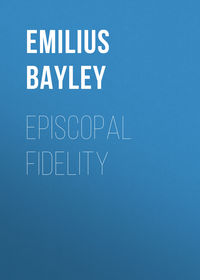Das Buch kann nicht als Datei heruntergeladen werden, kann aber in unserer App oder online auf der Website gelesen werden.
Buch lesen: "Episcopal Fidelity"
THIS SERMON IS AFFECTIONATELY INSCRIBED
‘Our Reformers seem to have designed to leave a certain latitude on points which they regarded as not of fundamental importance; and if we would approve ourselves genuine disciples of those illustrious men, we must not seek to narrow the basis on which they reared their noble edifice, nor to exclude any whom they intended to admit. As however there are some differences which do not, so there are others also which do, imply the existence of principles adverse to the spirit of our Church, and the prevalence of these ought doubtless to be guarded against.’ – Archbishop Whately, On the Use and Abuse of Party-Feeling in Religion. pp. 245, 246.
‘We are not to hold a society together by renouncing the objects of it; nor to part with our faith and our hope, as a means of attaining charity; but rather seek to combine the three; and by earnest zeal, without violence or bigotry, – by firmness, accompanied with moderation, discretion, and temper, – by conciliating adversaries without sacrificing the truth, – and by hearty yet mild co-operation with friends, to obtain the advantages of party-feeling, yet avoid its evils; and promote peace, without falling into indifference.’ —Ibid. pp. 29, 30.
A SERMON
‘Take heed unto thyself, and unto the doctrine; continue in them: for in doing this thou shalt both save thyself and them that hear thee.’ – 1 Tim. iv. 16.
Our thoughts turn naturally to-day to the subject of the Christian ministry; and especially to that high office in it to which our brother in Christ is about to be admitted.
Scripture perhaps contains no exact model of the Episcopal office as it now exists. It is not identical with the Apostolate.1 Neither again can it be satisfactorily proved to be precisely identical with the office held by Timothy at Ephesus, and by Titus at Crete. St. Paul’s language implies that the position which they held was temporary; they formed, as it were, the link between the Apostle whose superintendence was occasional, and the bishop whose rule was permanent.
We must rather seek some central idea if we would grasp the highest aim of the Episcopate: and we find that idea not in the outward framework of the Church, but in the truth which it enshrines: not in Apostolic order, however valuable, but in Apostolic doctrine: not in a succession of form, but in a succession of faith, ‘the faith once for all delivered to the saints.’ (Jude, 3.)
And this leads us to the text: in which the Apostle touches upon the official life, the personal life, the consecrated life of one who was called upon to discharge for a while Episcopal functions: ‘Take heed unto the doctrine:’ ‘Take heed unto thyself:’ ‘Continue in them:’ enforcing his exhortation by the promise, ‘for in doing this, thou shalt both save thyself and them that hear thee.’
The Official Life. ‘Take heed unto the doctrine.’
As believers in the Divine origin of Christianity, we assume that there was revealed to the Apostles a body of religious truth, definite, complete, unchangeable.
In the pastoral Epistles this distinctive body of truth is frequently referred to, as ‘the pattern of sound words’ (2 Tim. i. 13), ‘the sound (healthful) doctrine’ (1 Tim. i. 10; 2 Tim. iv. 3; Tit ii. 1), ‘the doctrine which is according to godliness’ (1 Tim. vi. 3), ‘the gospel of the glory of the blessed God’ (1 Tim. i. 11), ‘the good deposit’ (1 Tim. vi. 20; 2 Tim. i. 14); ἡ πίστις, τὸ χήρυγμα, according to the gloss of Chrysostom; Catholicæ fidei talentum.
Of this body of truth, Divine in its origin, and invested with Divine authority, two things may be predicated; first, that it is unchanged and unchangeable; secondly, that it is embodied in the Articles and Formularies of the Church of England.
It may be allowed that in all ages change has been the law of human affairs. But it is a mistake to associate this law of change with the central truths of Christianity; and for this reason, that Christianity is founded upon facts, upon events that have actually taken place; and if these facts are incapable of change, then are the doctrines which are founded upon them incapable of change also. Men may seek to sweep away the objective reality of Christianity; but, failing as they do in this, then inasmuch as the facts upon which Christianity reposes have been already wrought, and cannot be undone, the Gospel which we preach partakes of the immutability of those facts, and is alike unchangeable.
Equally certain is it, that the great Christian truths which were held in apostolic and primitive days, are identical with those which are embodied in the teaching of the Church of England.
True indeed we are liable to attack. We are met on the one side by the champions of scientific scepticism, and on the other, by the adherents of modern Rome; the one seeking to destroy the historical basis of our faith, the other to press upon us conclusions for which we find no warrant in God’s written word.
